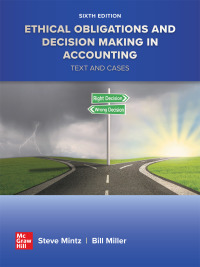Section 179 of the IRS tax code allows qualifying businesses to deduct the full cost of eligible
Question:
Section 179 of the IRS tax code allows qualifying businesses to deduct the full cost of “eligible property” on their income taxes as an expense, rather than requiring the cost of the property to be capitalized and depreciated over its useful life. The provision was adopted into law to help businesses.
For 2020, the deduction limit was $1,040,000 and applies to new and used equipment, as well as off-the-shelf software. The rules state that the deduction can only be taken if the equipment was financed or purchased and put into service between January 1, 2020, and December 31, 2020. The code says a business has to be profitable to use the deduction, and it needs to elect it; it’s not automatic. The business cannot deduct more than its business income for the year.
Madison just transferred into to the tax department of Cohn and Klein, CPAs. She wants to get off to a good start. Madison has just come across a situation where their client, So What Inc., deducted the full cost of three equipment purchases for its 2020 tax return. The amount in total is $560,000.
Madison traced the deduction back to the original invoices and found that the company met all of Section 179 rules except one that still had to be determined. That was whether the equipment was put into service between January 1 and December 31, 2020. She was able to find some documentation in the production department that said it was purchased on December 30, 2020 and put into service on January 4, 2021.
Madison knew this made the property ineligible for Section 179 treatment. She approached the production manager and confirmed the January 4 date. At this point, Madison decided to discuss the matter with David, the senior on the tax engagement. David agreed with Madison. They went to discuss the matter with the tax manager who explained to them that So What had been hemorrhaging cash. The deduction would enable it to save $118,000 ($560,000 × 21% tax rate). Given that its net income for the year was $120,000, the deduction would all but wipe out taxable income.
The tax manager, Mark, went to see the CFO of So What. The CFO in no uncertain terms told Mark to deduct the full $560,000 in 2020. The explanation was simple: The equipment was purchased in 2020 and even though it wasn’t put into service until January 4, 2021, there was no way the IRS would know.
Cohn and Klein decided to go along with the client for fear of losing not only the tax engagement but audit work as well and lucrative consulting services.
Mark explained the matter to David who explained it to Madison. David advised Madison to go along and not take the matter further. However, Madison always considered herself to be an ethical person and knew what was being asked of her was wrong.
Assume you are in Madison’s place. Answer the following questions.
Questions
1. What are Madison’s ethical obligations under the AICPA Code of Professional Conduct assuming she is a CPA?
2. Drawing upon the concepts and ethical theories presented in the chapter answer the following question: What should Madison do next and why?
Step by Step Answer:

Ethical Obligations And Decision Making In Accounting Text And Cases
ISBN: 9781264135943
6th Edition
Authors: Steven Mintz





